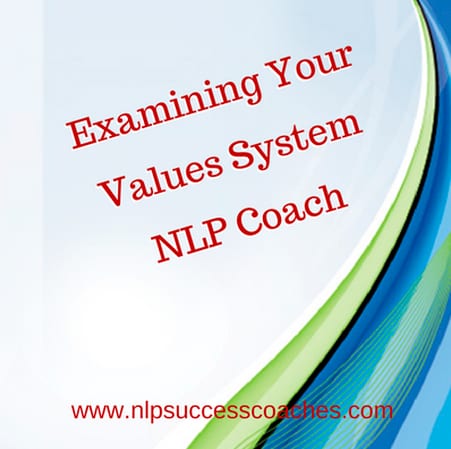
Examining Your Values System NLP Coach
Can people live without values?
https://www.youtube.com/watch?v=_w93lgAe1rk
We often hear people complaining that the current generation “has no values” and that we are all somewhat doomed because of this decided lack of a values system. Well, personal opinions aside, this statement can never be technically true. Why? Because everyone has values.
The civilization as we know it would crumble in a matter of months if we didn’t have values systems in place. When someone says that someone “has no values” what that means is: “that person does not have the exact same values as I do.”
So, what are values?
Values are what motivates us. Values are what motivates us in advance. They relate directly to how we spend our time, because we spend our time according to what motivates us, what’s important to us. Values also are how we feel about what we’ve done after wards, after what we’ve done something. Do we feel that was appropriate or inappropriate? Do we feel good or bad? Do we feel that was right or wrong? Values are not what we like or dislike, they’re not what we desire, “values are what we are motivated to do”.
Where do values come from?
Our values come from our parents, friends we hang out with, our religious background, our environment, books we read, the education we acquire, media we listen to or watch, our economic background, geography, school we go to, and our family.
How do our values work?
Values, and Beliefs and Attitudes are part of what filter our external reality as information comes in and becomes our Internal Representation.
So by adopting certain beliefs we can increase our results in NLP over and above having beliefs which are dis-enabling or which don’t produce or provide us with the proper belief system in order to produce great results.
Our values have a higher place than our belief system in our subconscious mind. We can say values dictate how we form our new beliefs and determines what happens to our old beliefs. Our values provide a larger road-map of what is right or wrong and provide our motivation for action.
For example, if a person values friendship, he may have the belief that “one must always be helpful to good friends at all times.” The value comes before the belief and then the belief is shaped. Once the belief is shaped and we clearly understand it, our subconscious mind then uses it as a guidepost for our future decision-making.
Like beliefs, values can spell the difference between a highly successful life and a life filled with unhappiness and setbacks. Your values determine not only your conscious thinking processes but also your general behavior.
Unlike beliefs, values are embedded much more deeply in our subconscious mind and it takes time to bring them to the mind’s surface in a form that can be expressed and understood clearly.
So, What does a values system look like?
We said our values are often centered around our life domains such as: our family, our social circles, our friends, our companions, love and ultimately, happiness. If we were to create a ladder of our values, hierarchy of our values with our top one being the family, the peak being family then coming down happiness will be almost to the top with that hierarchy.
So, each person can have more than one active values system in place. Values systems are dynamic and they tend to change subconsciously if powerful new experiences come in. Let me give you an example, let’s say we’ve got this happy go lucky guy could and what happens his girlfriend gets pregnant and gives birth to his child. Then all of a sudden this happy lucky go guy changes his values, becomes responsible, gets a job and starts providing for his child. That is a life experience that changes his value.
So in life we have means values and we have ends values. Now, what are those, what are means values and ends values?
Central values like “artistic expression” or “personal freedom” are often held up by supporting values like “stable employment” and “being frugal.”
A means value allows a person to achieve ends values. Means values are not necessarily dependent on ends values, while ends values cannot be supported adequately without the existence of means values.
For example, if a person regards “personal freedom” as his most important value in life, he may hold beliefs like he should be able to travel the world, anywhere in the world that he wants to or that continuing his education or his personal growth.
In order for such a person to follow his dreams and to follow his most important value in life, he must have means values to support it, like valuing continued employment or valuing the wise investment of money. He must have that value in order to support his value of traveling the world.
A value can also be classified as a “towards” value or “away from” value.
Let me define what Toward means and Away From means. Toward means you’re moving toward what you want. Let’s take a common problem in career which is compensation or income, making enough money in your career that you’ve chosen.
Now, many people when they focus on career, will focus on making good money from that career. And some people will focus on something quiet different from that which is they’ll focus on not getting into poverty.
Now, it’s not obvious that money as a Toward and poverty as a Away From and that would be avoiding poverty. It’s not obvious that moving away from poverty or moving toward money actually produce similar results. They both will produce money but the problem is when you’re moving away from poverty, moving away from it will not produce long term success or long term results. The problem is when you focus on what you don’t want, you’re likely to get it. Your subconscious mind doesn’t know the difference between not getting something or getting something. It drops the “Don’t” or the “Not” and it goes and gets for you what you focus on. So, when you move toward something, it goes like this, I am moving toward this and I want it and I’m going for it.
When I move away from something, I’m moving in the same direction as if I’m going up but I’m facing away from what I don’t want. Here’s the poverty, I don’t want it, I don’t want it, I’m still moving in the same direction. Now when I’m far enough from this that I don’t want, that I keep going and looking back at it, then the motivation goes away. That’s what we call “Burn Out”. You moved far away from it, so you start relaxing and you lose your motivation. The problem is when I’m far enough from what I don’t want or you don’t want, your motivation goes away or goes down. Your motivation disappears. Now there is nothing wrong with that it’s just a little more excitement than I would like.
So, a normal individual would want a life that is fulfilling and full of happiness. Because we all typically have this singular desire for an ideal life, so our values like I said could be towards something we want or moving toward something we want or it could be moving away from something we don’t want.
Not all values are equal. Like beliefs, the way our values are formed depends on our life experiences (both positive and negative). However, when a value is stated in the “away from” structure, it often means that we subconsciously crated and subscribed to this value because of past trauma.
Any negatively influenced value will almost always have a detrimental effect on how you set out to accomplish goals associated with that value, be it career, be it relationship. So even if you have a positive intention like “making money out of your career” you have a positive intention for keeping the value, if the movement is “away from poverty” then the whole experience becomes charged with negative emotions.
So you can choose to move toward or away from something. I’m going to suggest that you need to discover what’s the away from are in your values hierarchy. No matter where that value system is, whether it’s your relationships, your career, your personal development, your health, to see what your moving toward and what your moving away from are and change those moving away froms in that value hierarchy. How do you do that? You get rid of your negative emotions. Like I said, away froms, are created from past traumas. So, to that extent focus on what you don’t want and you get what you don’t want. Focus on what you want and you will get what you want.
So, I’d like to suggest focus on what you want.
Did This Help You? If so, I would greatly appreciate it if you commented below and shared on Facebook.

